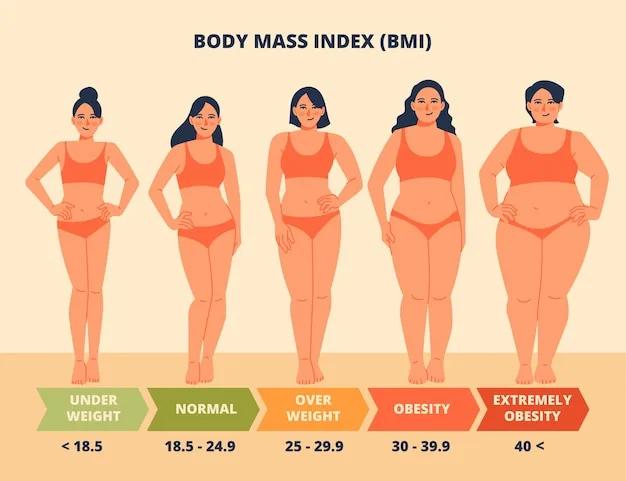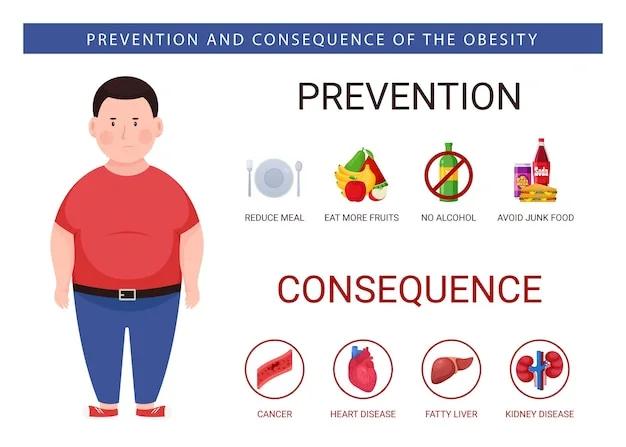
Reaching and maintaining a healthy weight is crucial for overall health and well-being. It not only helps prevent and control various diseases and conditions but also boosts self-confidence and provides more energy to enjoy life. In this article, we will explore practical ways to achieve and maintain a healthy body mass index through a balanced diet, healthy habits, regular physical activity, and lifestyle changes.
Understanding BMI
BMI is a valuable measure of being overweight and obesity, calculated using a person’s weight and height. It provides an estimate of body fat and helps determine if an individual is underweight, at a healthy weight, overweight, or obese. While BMI has its limitations, it serves as a useful tool for assessing weight and health status.
Factors contributing to a healthy weight
Several factors influence a person’s weight, including genetics, environment, metabolism, and behaviors or habits. While some factors are beyond our control, making positive lifestyle changes can significantly impact weight management. To achieve and maintain a healthy weight, it is important to consider the following:
1. Energy balance
Maintaining a healthy body weight requires a balance between energy intake (calories consumed) and energy expenditure (calories burned). When energy intake and expenditure are equal, weight remains stable. Consuming more calories than the body needs leads to weight gain while consuming fewer calories than burned results in weight loss.
To achieve energy balance and maintain a healthy weight, it is essential to:
- Follow a healthy and balanced diet, rich in nutrients and low in empty calories
- Reduce daily calorie intake by 500 calories if overweight or obese, to promote weight loss
- Engage in regular physical activity to increase energy expenditure
- Limit sedentary behaviors and incorporate more movement throughout the day
2. Healthy eating
A nutritious healthy diet plays a crucial role in achieving and maintaining a healthy weight. It is important to focus on:
- Eating a variety of nutrient-dense foods, including fruits, vegetables, whole grains, lean proteins, and healthy fats
- Choosing foods low in added sugars, saturated fats, and sodium
- Smaller portion control to avoid overeating
- Listening to hunger and fullness cues to eat mindfully
- Planning meals ahead of time to make healthier choices
By adopting these healthy eating habits, individuals can nourish their bodies while managing their weight effectively.
3. Regular physical activity
Physical activity is an integral part of a healthy lifestyle and weight management. It not only helps burn calories but also improves cardiovascular health, strengthens muscles, and boosts overall well-being. To incorporate more physical activity into your daily routine:
- Engage in moderate-intensity aerobic exercises, such as brisk walking, cycling, or swimming, for at least 150 minutes per week
- Include strength training exercises at least two days a week to build and maintain muscle mass
- Find activities you enjoy and make them a regular part of your routine
- Stay active throughout the day by taking the stairs, walking instead of driving for short distances, or participating in active hobbies
By making physical activity a priority, individuals can improve their fitness levels and achieve a healthy weight.
Benefits of achieving a healthy weight
Maintaining a healthy BMI offers numerous benefits for overall good health and well-being:
1. Reduced risk of chronic diseases
Achieving and maintaining a healthy weight significantly reduces the risk of developing chronic health conditions such as heart disease, high blood pressure, type 2 diabetes, high cholesterol, gallstones, breathing problems, and certain cancers. By managing weight effectively, individuals can improve their overall health outcomes and enhance longevity.
2. Improved cardiovascular health
Being at a healthy weight lowers blood pressure, reduces cholesterol levels, and decreases the risk of heart disease and stroke. By adopting a healthy lifestyle and managing weight, individuals can support their cardiovascular health and reduce the burden on their heart.
3. Enhanced blood sugar control
Maintaining a healthy weight is crucial for individuals with or at risk of developing type 2 diabetes. Weight loss can improve insulin sensitivity, and blood sugar control, and reduce the need for medication. By achieving and maintaining a healthy weight, individuals can better manage their diabetes and reduce the risk of complications.
4. Increased energy and vitality
Carrying excess weight can lead to fatigue and decreased energy levels. By achieving a healthy weight, individuals often experience increased energy and vitality, allowing them to engage in daily activities with ease and enjoyment.
5. Boosted self-confidence
Achieving and maintaining a healthy weight can enhance self-confidence and body image. Feeling comfortable and confident in one’s own body positively impacts mental health and overall quality of life.
Practical tips for achieving and maintaining a healthy weight
Now that we understand the importance of maintaining a healthy weight, let’s explore some practical tips to help individuals achieve and sustain their desired BMI:
1. Set realistic goals
Start by setting realistic and achievable weight loss goals. Aim for gradual and steady weight loss, as rapid weight loss can be difficult to maintain and may have negative health implications. Consult with a healthcare professional or registered dietitian to determine a healthy and sustainable weight loss plan.
2. Create a balanced meal plan
Develop a well-rounded meal plan that includes a variety of nutrient-dense foods. Incorporate fruits, vegetables, whole grains, lean proteins, and healthy fats into your diet. Consider portion sizes and practice mindful eating to prevent overeating.
3. Practice portion control
Be mindful of portion sizes to avoid consuming excess calories. Use smaller plates and bowls, and pay attention to hunger and fullness cues. Avoid eating directly from packages, as it can lead to mindless snacking.
4. Stay hydrated
Drink an adequate amount of water throughout the day to stay hydrated and support overall health. Water can help curb appetite and prevent overeating. Limit sugary beverages and opt for water, herbal tea, or infused water instead.
5. Engage in regular exercise
Incorporate physical activity into your daily routine to support weight management and overall health. Aim for at least 150 minutes of moderate-intensity aerobic exercise per week, along with strength training exercises twice a week. Find activities you enjoy to stay motivated and make exercise a sustainable habit.
6. Prioritize sleep
Adequate sleep is essential for maintaining a healthy weight. Lack of sleep can disrupt hunger and fullness hormones, leading to increased appetite and cravings. Aim for 7-9 hours of quality sleep each night to support weight management and overall well-being.
7. Manage stress
Chronic stress can contribute to weight gain and hinder weight loss efforts. Find healthy ways to manage stress, such as practicing mindfulness, engaging in relaxation techniques, or participating in activities that bring joy and relaxation.
8. Seek support
Consider joining a support group or seeking guidance from a healthcare professional or registered dietitian. Having a support system can provide accountability, motivation, and expert advice to help you achieve and maintain a healthy weight.
9. Monitor progress
Regularly track your progress to stay motivated and make necessary adjustments. Keep a food and exercise diary, record measurements, and celebrate milestones along the way. Remember that sustainable weight loss takes time and consistency.
10. Maintain a positive mindset
Adopt a positive mindset and focus on the long-term benefits of achieving a healthy weight. Embrace the journey and celebrate small victories. Surround yourself with positive influences and practice self-compassion throughout the process.
Conclusion
Achieving and maintaining a healthy weight is essential for overall health and well-being. By following a balanced diet, engaging in regular physical activity, and making positive lifestyle changes, individuals can improve their quality of life and reduce the risk of health problems. Remember, weight management is a lifelong journey, and small, sustainable changes can lead to significant health benefits and well-being. Embrace the challenge, seek support when needed, and celebrate the progress along the way.
Sources
- Maintain a Healthy Weight
- Healthy Weight, Nutrition, and Physical Activity | Healthy Weight, Nutrition, and Physical Activity – CDC
- Aim for a Healthy Weight – MyHealthfinder – health.gov
NowPatient has taken all reasonable steps to ensure that all material is factually accurate, complete, and current. However, the knowledge and experience of a qualified healthcare professional should always be sought after instead of using the information on this page. Before taking any drug, you should always speak to your doctor or another qualified healthcare provider.
The information provided here about medications is subject to change and is not meant to include all uses, precautions, warnings, directions, drug interactions, allergic reactions, or negative effects. The absence of warnings or other information for a particular medication does not imply that the medication or medication combination is appropriate for all patients or for all possible purposes.









